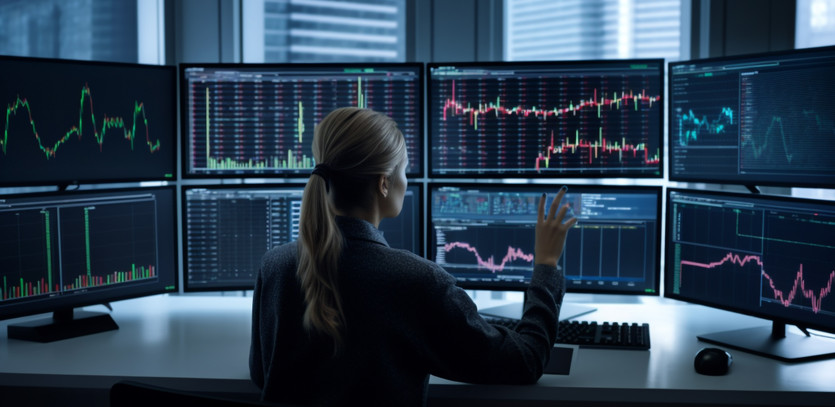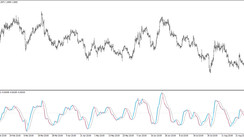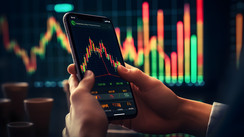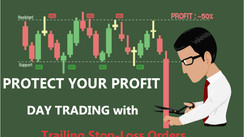Just as with any investment venture, the foreign exchange market—commonly known as forex—offers no absolute guarantees of profit. Yet, the potential risks should not deter you from exploring this dynamic financial ecosystem.
Understanding and navigating the forex market requires a blend of knowledge, strategy, and a measured approach. By adhering to a set of prudent practices, you can substantially mitigate potential losses and enhance your chances of trading success.
In this article, we shed light on a series of best practices that can act as your compass in the vast expanse of the forex trading landscape. So, buckle up, and let's embark on a journey to understand how to navigate the forex market with confidence and precision.
Remember, the path to successful forex trading is not a sprint—it's a carefully paced marathon. Prepare to pace yourself, learn from your experiences, and cultivate the right set of skills for a rewarding trading journey.
The Secret to Success
Trading in the world of foreign exchange is much like navigating uncharted waters, where moving with calculated caution is the key. One of the indispensable principles in forex trading is to adopt a gradual approach and avoid hasty decisions.
The forex market is characterized by high-leverage ratios. These ratios typically range from 50:1 to 100:1 and, under certain circumstances, can even escalate to 200:1. What this implies is rather intriguing: with an initial investment as modest as $25, you could theoretically reap a profit nearing $500. However, it's vital to acknowledge the double-edged sword that leverage can be. If the market shifts unfavorably, even the maximum leveraged investment can be obliterated in a matter of seconds.
In the realm of forex trading, a unique feature sets it apart from traditional stock trading: ease of access. A concise questionnaire detailing trading goals, a valid ID, and a debit card is all you need to dive into forex trading. Furthermore, this venture doesn't demand an initial deposit, providing you with access to margin ratios that are unparalleled in the stock market.
While these aspects of forex trading may seem attractive, they can also mislead aspirants hoping for a quick financial windfall. But here's the stark reality: forex trading isn't akin to a lottery draw. In the foreign exchange market, it's not a game of chance, but a game of skill. A skill, unfortunately, often neglected by novices who plunge headlong into trades without acquiring adequate knowledge.
To ensure a smoother and safer entry into forex trading, consider the following guidelines:
-
Tread lightly: Approach the market with caution and informed awareness. Remember, forex trading isn't a race but a journey of financial growth.
-
Set loss limits: Before initiating any trades, determine the amount of loss you can withstand. Once decided, adhere to these limits strictly.
-
Avoid reactionary trading: One of the most harmful practices is to follow a substantial losing trade with another one, hoping to offset the losses. This isn't trading—it's reckless gambling.
-
Patience pays: Forex trading is a long-term game. It may not provide overnight profits, but consistent, strategic moves can yield substantial gains over time.
Trading in the forex market can be a highly rewarding experience, provided you approach it with prudence and patience. By integrating a gradual and calculated approach, you not only protect your investments but also create the potential for substantial financial growth. Remember, success in forex trading is a marathon, not a sprint.
Preparation: The Key to Forex Trading Success
Engaging in forex trading without prior preparation is akin to stepping into a battlefield unarmed. As humorist and American songwriter Tom Lehrer wisely points out in his song "Be Prepared", readiness for life's challenges is not just a suggestion—it's a necessity. This sentiment rings particularly true for those stepping foot into the dynamic world of forex trading. Lacking adequate preparation before diving into trading can lead to mediocre outcomes at best.
Statistically speaking, around two-thirds of forex traders end up losing money, some to the extent of falling into a cycle of insurmountable high-interest credit card debt. However, these discouraging stats should not deter budding traders. Instead, they should serve as a potent reminder of the importance of preparation. Let's delve into two instrumental methods that can ensure a successful journey into forex trading:
-
Educate Yourself: Forex trading literature offers a wealth of knowledge and insights. From basic trading principles to complex market analysis techniques, these resources serve as a treasure trove for both beginners and seasoned traders. Platforms like Amazon provide an extensive range of forex trading books, and customer reviews can guide you towards the most valuable reads.
-
Practice Makes Perfect: The age-old adage holds true in the realm of forex trading. Consider opening a practice trading account with a reputable forex brokerage. Most major US-based firms offer these free of charge. Take this opportunity seriously and track your results meticulously. Remember, each trade—successful or not—provides a learning experience to refine your trading strategy.
-
Record and Analyze: The practice software maintains a record of all your trades. Analyze this data to understand why certain trades were profitable while others weren't.
-
Learn from Mistakes: Don't be disheartened by initial losses—they're part of the learning curve. Use these experiences to fine-tune your trading approach.
-
Patience and Persistence: Continue practicing until you start seeing positive results over an extended period. This practice is an invaluable phase of trial and error, equipping you with skills to navigate the real market.
-
Forex trading is no different from any other skill—it requires time, dedication, and practice to master. While the statistics may seem daunting, remember that every successful trader began their journey with the first step: preparation. Equip yourself with the right knowledge, fine-tune your skills with practice, and approach the forex market with confidence. Success, then, will be a matter of 'when', not 'if'.
Discipline: The Lifeline of Forex Trading
In the fast-paced, dynamic world of forex trading, discipline is not just an attribute—it's a lifeline. A disciplined trader is akin to a seasoned mariner, calmly navigating the market's stormy waters with a steady hand and an unwavering gaze. In the face of market volatility and uncertainty, discipline helps ensure survival and, more importantly, success.
Becoming a disciplined trader involves several critical elements:
-
Defining Loss Thresholds: Before even placing your first trade, establish your loss tolerance. This means deciding on a maximum loss you're willing to accept. Once set, this limit must remain inflexible, regardless of market conditions or individual trade outcomes. A bad trade should not cause you to rashly alter your well-considered limits.
-
Sticking to Your Trading Plan: Every successful trader operates with a trading plan—a strategic blueprint outlining their methods and principles. When you begin live trading, faithfully apply the methods you honed during your practice trading phase. Don't deviate from your plan under the illusion of chasing higher profits or making up for losses.
-
Maintaining Emotional Balance: The emotional roller-coaster of trading can lead to hasty, ill-considered decisions. Cultivate emotional discipline to ensure you remain steadfast, undeterred by market highs and lows.
Understanding the importance of discipline and integrating it into your trading practices can make a significant difference to your overall trading experience and, ultimately, your success. Remember, without discipline, you're likely to become another statistic—an inexperienced novice who exits the market after a few financially draining weeks. Discipline is not just a desirable attribute in forex trading, it's an essential ingredient for lasting success.
Avoid Forex Trading Scams
In an industry as vast and lucrative as forex trading, the lure of easy profits often attracts unsavory elements looking to exploit unsuspecting traders. The simple truth of the matter is that there are no guaranteed, surefire methods to turn quick, consistent profits in forex trading. It is, therefore, crucial for traders to stay vigilant and skeptical of anyone promising foolproof strategies or systems.
Here are some essential steps to safeguard your trading journey:
-
Skepticism is Healthy: Exercise skepticism towards anyone promising a method or system that "guarantees" results or pledges to produce a specific percentage of profits over a certain timeframe. Forex trading involves risks, and there are no sure-shot shortcuts to success.
-
Trade Through Reputed Platforms: Ensure that you only trade through well-established and renowned U.S. traders. This reduces the risk of falling prey to fraudulent schemes or malpractices.
-
Investigate Your Broker: Your chosen broker will play a crucial role in your forex trading experience. Conduct thorough background checks before finalizing your broker. You can leverage the National Futures Association, the U.S. self-regulatory body for forex trading, similar to the Financial Industry Regulatory Authority (FINRA) for stock brokerages. The Association's Broker Information System (BASIC) is a reliable service for broker verification. If your potential broker isn't listed or has a history of complaints, steer clear.
In the complex world of forex trading, staying informed and alert is your best defense against scams and frauds. The promise of quick riches may be alluring, but the path to genuine, sustainable success is paved with diligence, caution, and of course, a healthy dose of skepticism. Trade smart, trade safe.





